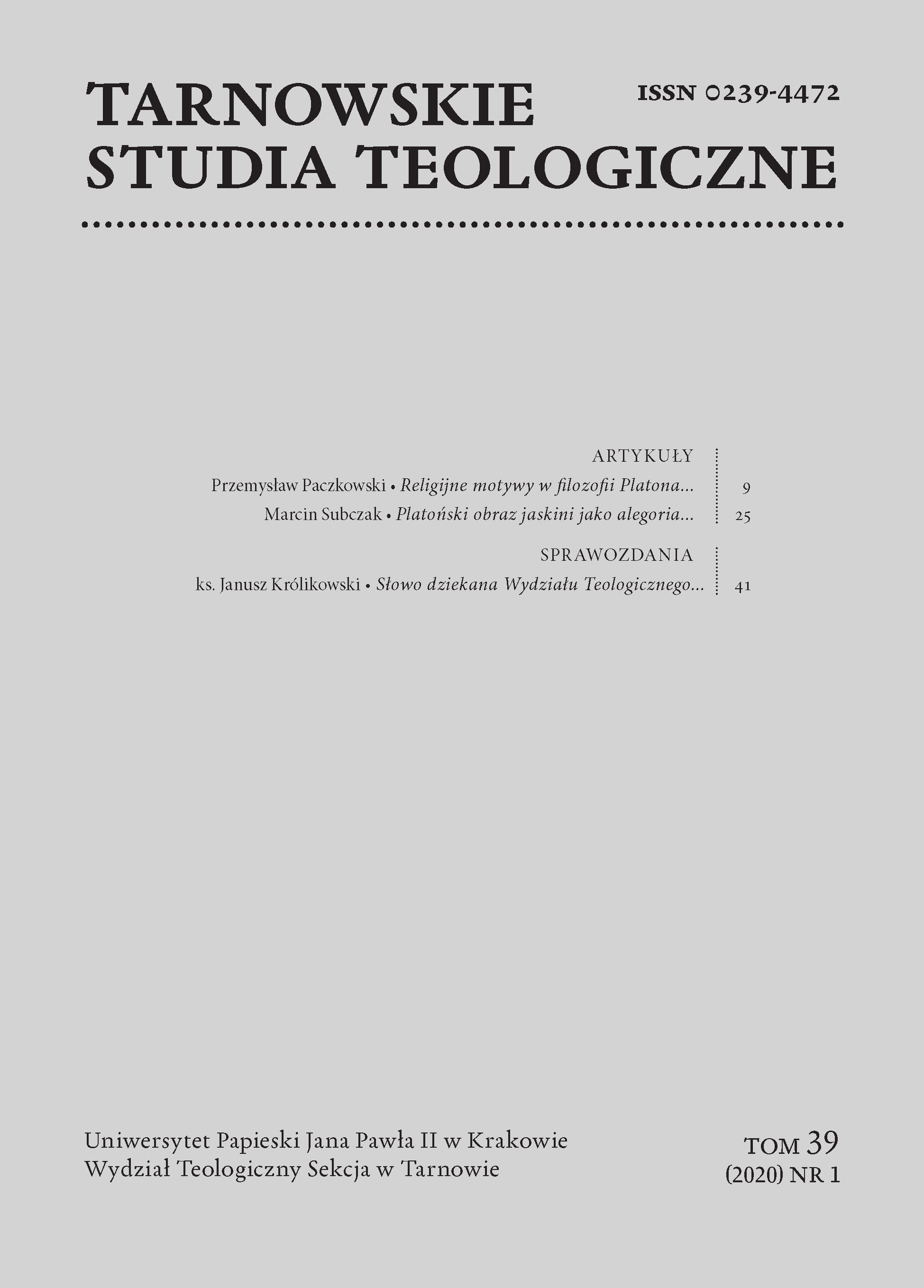Plato’s depiction of the cave as the allegory of the soul’s metamorphosis
DOI:
https://doi.org/10.15633/tst.39102Keywords:
Plato, The Republic, allegory of the cave, noetic cognition, conversion of the soulAbstract
In this paper I interpret depiction of the cave in a non-traditional way (ontological, epistemological, political etc.). At the first point I ask about the value of the depiction, myth and the allegory as a means of the convey of philosophical message. At the second point I argue that the depiction of the cave is par excellence the allegory. It contains mythical plot and specific explanation its meaning. At the third point I suggest get attention to the fact, that the allegory of the cave show not only static ontological and epistemological structure but also in dynamic and expressive way present some human’s history. The depiction of the cave represent the sequence of the facts and the consequence of the events as a description of the human’s lot and experiences. At the end I conclude that this dual (allegorical and dynamical) perspective gets one common deduction. Well, the primary sense of the allegory of the cave is to show some specific experience of the soul — its many-sided, radical metamorphose. To show innovation and quaintness this soul’s transformation Plato used a term of periago and periagoge.
References
A Greek-English Lexicon, compiled by H. G. Liddel, R. Scott, revised and augmented throughout by H. S. Jones, Oxford 1968.
Albert K., O Platońskim pojęciu filozofii, Warszawa 1991.
Albert K., Studia o historii filozofii, Warszawa 2006.
Albert K., Wprowadzenie do filozoficznej mistyki, Kęty 2002.
Arystoteles, Metafizyka, w: Arystoteles, Dzieła wszystkie, t. 2, Warszawa 1990, s. 601–857.
Blackburn S., Platon. Państwo. Biografia, Warszawa 2007.
Blandzi S., Henologia, meontologia, dialektyka. Platońskie poszukiwanie ontologii idei w „Parmenidesie”, Warszawa 1992.
Cherniss H., The Source of Evil According to Plato, w: Plato: A Collection of Critical Essays, t. 2: Ethics, Politics, and Philosophy of Art and Religion, ed. G. Vlastos, New York 1971, s. 244–258.
Dembiński B., Późna nauka Platona. Związki ontologii i matematyki, Katowice 2003.
Dembiński B., Zagadnienie skończoności w ontologii fundamentalnej Martina Heideggera, Katowice 1990.
Dembiński S., Teoria idei. Ewolucja myśli platońskiej, Katowice 2004.
Dodds E. R., Plato and the Irrational Soul, w: Plato: A Collection of Critical Essays, t. 2: Ethics, Politics, and Philosophy of Art and Religion, ed. G. Vlastos, New York 1971, s. 206–229.
Domaradzki M., Filozofia antyczna wobec problemu interpretacji. Rozwój alegorezy od przedsokratyków do Arystotelesa, Poznań 2013.
Fearn F., Zenon i żółw. Jak myślą filozofowie, Warszawa 2007.
Gadamer H.-G., Prawda i metoda. Zarys hermeneutyki filozoficznej, Warszawa 2004.
Gajda J., Platońska droga do idei. Aksjologiczny rodowód platońskiej ontologii, Wrocław 1993.
Gigon O., Główne problemy filozofii starożytnej, Warszawa 1996.
Guthrie W. K. C., A History of Greek Philosophy, t. 4: Plato: The man and his dialogues. Earlier period, Cambridge 1998.
Guthrie W. K. C., Plato’s Views on the Nature of the Soul, w: Plato: A Collection of Critical Essays, t. 2: Ethics, Politics, and Philosophy of Art and Religion, ed. G. Vlastos, New York 1971, s. 230–243.
Hadot P., Filozofia jako ćwiczenie duchowe, Warszawa 2003.
Heidegger M., Platona nauka o prawdzie, w: M. Heidegger, Znaki drogi, Warszawa 1999, s. 179–210.
Jaeger W., Paideia. Formowanie człowieka greckiego, Warszawa 2001.
Kahn C., Platon i dialog sokratyczny. Wykorzystanie literackiej formy na użytek filozofii, Warszawa 2018.
Kołakowski L., Horror metaphysicus, Kraków 2012.
Lakoff G., Johnson M., Metafory w naszym życiu, Warszawa 2010.
Narecki K., Logos we wczesnej myśli greckiej, Lublin 1999.
Paczkowski P., Filozoficzne modele życia w klasycznym antyku. (IV w. p.n.e.), Rzeszów 2005.
Paczkowski P., Jedność filozofii Platona, Rzeszów 1998.
Penner T., Thought and Desire in Plato, w: Plato: A Collection of Critical Essays, t. 2: Ethics, Politics, and Philosophy of Art and Religion, ed. G. Vlastos, New York 1971, s. 96–118.
Platon, Państwo, w: Platon, Państwo. Prawa (VII ksiąg), przeł. W. Witwicki, Kęty 2001, s. 11–338.
Reale G., Co Platon ma do powiedzenia współczesnemu człowiekowi, w: Platon. Nowa interpretacja, red. A. Kijewska, E. I. Zieliński, Lublin 1993, s. 39–54.
Reale G., Historia filozofii starożytnej, t. 2: Platon i Arystoteles, Lublin 2005.
Ricoeur P., Symbolika zła, Warszawa 1986.
Santas G., Plato’s Protagoras and Explanation of Weakness, w: The Philosophy of Socrates. A Collection of Critical Essays, ed. G. Vlastos, Notre Dame (Indiana) 1980, s. 264–298.
Skrzypek-Faluszczak J., Ocalenie od zła w filozofii Platona, Kraków 2010.
Stróżewski W., W kręgu wartości, Kraków 1992.
Stróżewski W., Wykłady o Platonie. Ontologia, Kraków 1992.
Szlezák T. A. O nowej interpretacji platońskich dialogów, Kęty 2005.
Szlezák T. A., Czytanie Platona, Warszawa 1997.
Wolicka E., Mimetyka i mitologia Platona. U początków hermeneutyki filozoficznej, Lublin 1994.
Downloads
Published
Issue
Section
License

This work is licensed under a Creative Commons Attribution 4.0 International License.
Authors who publish with this journal agree to the following terms:
- Authors retain the copyright and full publishing rights without restrictions, and grant the journal right of first publication with the work simultaneously licensed under a Creative Commons Attribution 4.0 International License that allows others to share the work with an acknowledgement of the work's authorship and initial publication in this journal.
- Authors are able to enter into separate, additional contractual arrangements for the non-exclusive distribution of the journal's published version of the work (e.g., post it to an institutional repository or publish it in a book), with an acknowledgement of its initial publication in this journal.
- Authors are permitted and encouraged to post their work online (e.g., in institutional repositories or on their website) prior to and during the submission process, as it can lead to productive exchanges, as well as earlier and greater citation of published work (See The Effect of Open Access).

